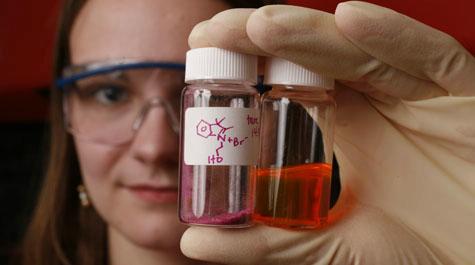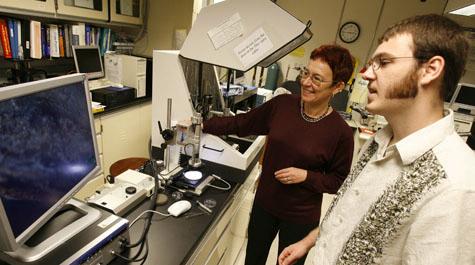W&M receives nearly $2 million to prepare math, science teachers
The College of William and Mary recently received nearly $2 million in grants to help prepare students to become science and math teachers in high-needs schools.
A National Science Foundation grant for $750,000 will establish the Noyce Scholars Program at the College of William and Mary, and a $1,172,507 grant from the Department of Education will establish the Teachers for a Competitive Tomorrow (TCT) Teaching Fellows Program at the College of William and Mary. The grants are being administered in a partnership between William and Mary’s School of Education and Arts & Sciences.
“These grants from the National Science Foundation and the U.S. Department of Education make clear, once again, the College’s preeminence in training K-12 teachers,” said William and Mary President W. Taylor Reveley III. “It’s especially good that the grants hinge on collaboration among our education, math and science faculties.”
The TCT grant will support summer research and science teaching internships for 50 undergraduate students over five years. The grant will also go toward developing three new courses in an attempt to recruit more science, technology, engineering and mathematics (STEM) majors into teaching. Those courses are: a freshman seminar on the importance of K-12 education to a free world, “How Students Learn,” and “Theory and Reality: Practicum in Science and Math Teaching in High-Needs Schools.” Support for TCT fellows is available beginning in the summer between their freshman and sophomore years at William and Mary. Upon graduation, the fellows will teach in high-needs schools.
"Securing these two highly competitive grants is a wonderful tribute to our programs at William and Mary and to the strong collaborative efforts among faculty in science and mathematics departments and the School of Education," said Virginia McLaughlin, dean of the School of Education and a co-principal investigator on both grants. "The funding will enable us to add some innovative features to our preparation programs to deepen student commitment to their disciplines and to teaching. We will also intensify recruitment so that prospective students learn more about teaching opportunities and the multiple pathways into the profession."
The Noyce grant will support 33 students – about half undergraduates and half master’s degree students -- over five years beginning in spring 2009. The fellows will receive $10,000 per academic year for up to two years (undergraduates) or for a year for the master’s degree work. The fellows will also gain access to new coursework as well as paid summer internship opportunities for research and internships in teaching. Recipients will teach in high-needs public school systems for two years for each year of funding received.
“William and Mary is pleased that our science and education faculty members can be supported in their collaborative work addressing one of our nation’s most pressing educational issues: improving the quality of science education for the next generation of students,” said Carl Strikwerda, dean of Arts & Sciences, which includes the College’s biology, geology, mathematics, and other science departments.
Faculty members from both the School of Education and Arts & Sciences make up the team that is administering the grants. The team members include Paul Heideman, professor and chair of the biology department; Heather Macdonald, chancellor professor of geology; Margie Mason, professor of education; Juanita Jo Matkins, an associate professor of education; and McLaughlin. For the Noyce grant, Heideman is the principal investigator and the others are co-principal investigators. For the TCT grant, Matkins is the principal investigator and the others are co-principal investigators. Other faculty members in both the School of Education and Arts & Sciences are also involved in making the grants possible.
“Together, the two grants will provide a package of preparation and support that will result in opportunities for William and Mary students to develop science and mathematics teaching skills, and will prepare them for meeting the challenge of teaching in school districts in great need of the commitment and talent of well-prepared and dedicated science and mathematics educators,” said Matkins.
Students interested in applying for either program should contact Dot Osborne, director of admissions and financial aid for the School of Education, at (757) 221-2308 or dot.osborne@wm.edu.
For more information about the School of Education, Arts & Sciences or other academic programs at William and Mary, visit http://www.wm.edu/academics/index.php.


















